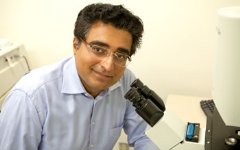Most common genetic heart valve abnormality associated with risk of aneurysm
The most common heart valve abnormality has now been linked to an increased risk of aneurysms.
Up to 2 per cent of the population has a genetic abnormality in which their aortic valve has only two cusps or hinges ensuring that oxygenated blood from the heart is directed to the rest of the body—a condition known as bicuspid aortic valve. Most people have three such cusps.
Physicians have known for years that many people with bicuspid aortic valves may require open heart surgery in early adulthood to replace their aortic valve with an artificial valve. Bicuspid aortic valve is responsible for more deaths and complications than the combined effects of all other congenital heart defects.
Dr. Subodh Verma, a cardiac surgeon at St. Michael’s Hospital, said it’s becoming increasingly clear that such people may also be at a higher risk of developing aortic aneurysms, which can lead to catastrophic complications such as aortic dissection (tear) and sudden death.
Dr. Verma published a review paper (1 MB PDF file) in the New England Journal of Medicine today providing new insights about the link between this genetic abnormality and aneurysms, and advising patients and physicians about optimal screening and management of this potentially fatal condition.
In his paper, Dr. Verma also questions whether the aneurysms form because of genetic problems with the structure of the aorta or because of changes in the blood flow that cause excessive stress on the wall of the aorta.
The authors describe three patterns of aneurysm formation in such patients, and suggest that two of the most common patterns may not be genetic as previously thought.
Dr. Verma said that patients with a bicuspid aortic valve need to know that they are at risk of developing not just valve failure but an aortic aneurysm. If they do have dilatation of the aorta or an aneurysm they must seek the advice of a cardiologist or cardiac surgeon to help understand the timing and extent of surgery.
“These operations are complex and at times require not only stopping the heart but also ceasing blood supply to the brain,” said Dr. Verma, who is also a scientist in the hospital’s Keenan Research Centre for Biomedical Science. “Therefore, it is paramount that the risk of complications from the surgery be weighed against the risk of aneurysm rupture or dissection.”
The authors suggest that once an aneurysm has developed patients should avoid strenuous activities that may increase blood pressure and cause the aneurysm to grow.
Many patients with bicuspid aortic valves will neither require surgery on their valve or their aorta, but will require routine surveillance with either an echocardiogram. Dr. Verma said close relatives of people with bicuspid aortic valves should also be screened to see if they have the condition.
This study was funded by the Heart and Stroke Foundation of Canada, the Canadian Institutes for Health Research and Canada Research Chairs.
About St. Michael’s HospitalSt. Michael’s Hospital provides compassionate care to all who enter its doors. The hospital also provides outstanding medical education to future health care professionals in 27 academic disciplines. Critical care and trauma, heart disease, neurosurgery, diabetes, cancer care, care of the homeless and global health are among the hospital’s recognized areas of expertise. Through the Keenan Research Centre and the Li Ka Shing International Healthcare Education Centre, which make up the Li Ka Shing Knowledge Institute, research and education at St. Michael’s Hospital are recognized and make an impact around the world. Founded in 1892, the hospital is fully affiliated with the University of Toronto.
( Press Release Image: https://photos.webwire.com/prmedia/7/187852/187852-1.jpg )
WebWireID187852
This news content was configured by WebWire editorial staff. Linking is permitted.
News Release Distribution and Press Release Distribution Services Provided by WebWire.
